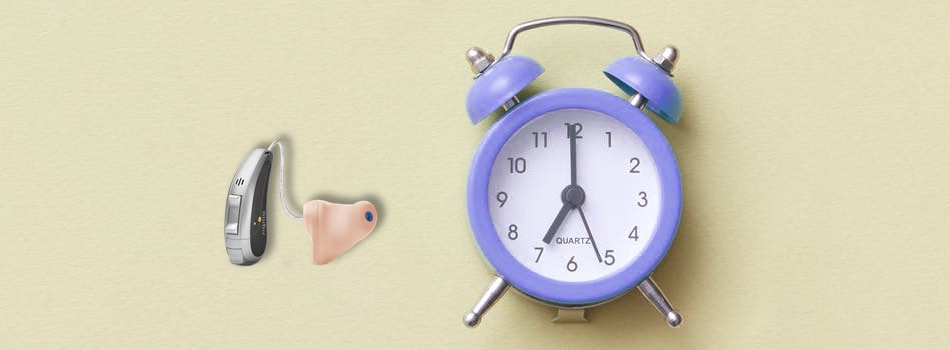It is recommended to wear hearing aids all day. For certain situations, hearing care professionals advise against use. An example of this is when showering, washing hair, or during sleep.
The reasoning behind this recommendation is as follows: We hear with our brain, not with our ear. And to make it easier for the brain to hear with hearing aids, a minimum amount of training is necessary.
Whether we want to strengthen our muscles, acquire a new skill, or learn a language. Any mental or physical function needs regular exercise. Anyone who participates in an athletic competition without any practice will not come close to matching the peak performance of well-trained competitors.
This is why hearing with hearing aids also needs to be trained. Hearing loss very often comes gradually, so that we do not even consciously notice the changes in the sound image. A hearing aid brings back all at once the fullness of sound that has been lost over the years.
Especially in the beginning, this can be too much for our brain. All sounds force themselves on the consciousness to be evaluated: Why does this crackle here? Did someone just say something? Was there something behind me? – All signs point to alarm.
Only regular wearing leads to an increasing habituation to the new sound. Recurring sounds are automatically recognized by the brain as important or unimportant, and the conscious mind can focus more easily on the desired sound.
Hearing aids are therefore training devices for the brain. If you only wear them in difficult situations, you will be just as overwhelmed as someone who never exercises and suddenly has to run a marathon. However, if you train regularly, after a certain period of time you will be successful, and hearing with a hearing aid will at first become less strenuous and at some point become the norm.

Of course, there are good reasons why you may not want to, cannot, or should not wear a hearing aid. If there are medical reasons why you should not wear a hearing aid permanently, your ear specialist will point this out to you. You can also trust your “gut feeling”. If you notice that you need a break, you should give your ear this break with a clear conscience.
Should I Wear Hearing Aids to Bed?
At night when sleeping or resting during the day, you should remove the hearing instrument. This allows the ear canal to be ventilated. This is why most people put their hearing aids out when they are asleep.
If you want to wear the hearing aids in bed to hear when the alarm of your clock goes on you can get a special alarm clock for people with hearing loss which is a lot louder than conventional ones. Some of them also vibrate in combination with a pad which you could place under your pillow in your bed.
In seldom cases like in when a doctor wears hearing aids and he or she needs to work on standby, it is advised to wear them. Otherwise, the alarm will not be heard. Things that should be considered then are good ventilation for the ear canal and in most cases a softer material for the custom earmold.
The reason is when you are awake your ears seldom get deformed by a little pressure. But when you sleep you may lay on one of your ears. In such a case it would be good if the piece in your ear is made out of a little softer material. This way the earpiece moves more with the ear and less pressure can be felt.
Can I Wear Hearing Aids With Headphones?
Wearing headphones at the same time as hearing aids is not a good combination. The hearing aids are optimally adjusted for listening to the environment.
If you now put headphones over them, the susceptibility to feedback increases with large headphones, small headphones do not fit in the ears at the same time as the hearing aids, and bone conduction headphones do not always fit at the same time in combination with hearing aids. What should be done instead? Is there even a solution? The answer is: fortunately yes.
The problem is essentially that you want to direct the sound from the TV or stereo as directly as possible into the hearing aid. The best way to do this is to use Bluetooth, which modern hearing aid manufacturers now offer. In most cases, these are small extra devices, also adapters, which you connect to your TV, and the Bluetooth signal is then transmitted directly into your ear. Old hearing aids often also have this function but only if in addition to the TV adapter on the TV to the hearing aids still an adapter close to the body is worn.
These are small boxes that you hang around your neck or clip to your clothing. You then connect these devices to both the player and your hearing aids and so the sound you play is fed directly into the hearing aids. In addition, the microphones of the hearing aids are usually muffled in the cases, so that you get no or only little ambient noise amplification. How much is attenuated, however, can be adjusted by the hearing care professional. Or you can adjust it using an app. Depending on the hearing aid.
What Happens if You Do Not Wear Hearing Aid?
Many people mistakenly think that hearing is trained if you listen without hearing aids every now and then. Unfortunately, the opposite is true. Every hour without hearing aids takes you away from natural hearing.
If, on the other hand, hearing aids are worn regularly, differentiated hearing and better speech understanding can be relearned. In addition, further deterioration of hearing is counteracted and spatial and directional hearing can be improved.
